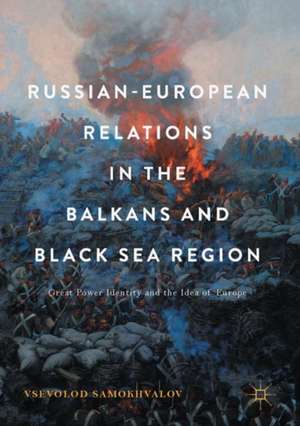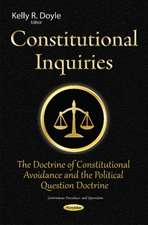Russian-European Relations in the Balkans and Black Sea Region: Great Power Identity and the Idea of Europe
Autor Vsevolod Samokhvaloven Limba Engleză Hardback – 20 iul 2017
| Toate formatele și edițiile | Preț | Express |
|---|---|---|
| Paperback (1) | 638.57 lei 6-8 săpt. | |
| Springer International Publishing – 13 mai 2018 | 638.57 lei 6-8 săpt. | |
| Hardback (1) | 643.99 lei 6-8 săpt. | |
| Springer International Publishing – 20 iul 2017 | 643.99 lei 6-8 săpt. |
Preț: 643.99 lei
Preț vechi: 757.63 lei
-15% Nou
Puncte Express: 966
Preț estimativ în valută:
123.24€ • 133.82$ • 103.52£
123.24€ • 133.82$ • 103.52£
Carte tipărită la comandă
Livrare economică 23 aprilie-07 mai
Preluare comenzi: 021 569.72.76
Specificații
ISBN-13: 9783319520773
ISBN-10: 3319520776
Pagini: 191
Ilustrații: XIII, 290 p. 5 illus.
Dimensiuni: 148 x 210 mm
Greutate: 0.52 kg
Ediția:1st ed. 2017
Editura: Springer International Publishing
Colecția Palgrave Macmillan
Locul publicării:Cham, Switzerland
ISBN-10: 3319520776
Pagini: 191
Ilustrații: XIII, 290 p. 5 illus.
Dimensiuni: 148 x 210 mm
Greutate: 0.52 kg
Ediția:1st ed. 2017
Editura: Springer International Publishing
Colecția Palgrave Macmillan
Locul publicării:Cham, Switzerland
Cuprins
I: Russian-European relations: an “unexpected” crisis.- II: Greatness, Identity and Method.-III: Writing Russianness, Greatness and Europe in the 1960s.-IV: Writing Russianness, Greatness, Europe and the Balkans in the late Soviet Discourse in the 1980s.- V: Russian-European Security Interaction and the Idea of Great Powerhood between 1991-1999.- VI: Reinvention of Europe and EU-Russia Relations in Putin’s Era 2000-2010.- VII: “Black Swan”: New Greatness, False Europe and the Ukraine Crisis (2002-2014) .- VIII: Conclusions.
Recenzii
“With this book, Vsevolod Samokhvalov makes an important contribution to the literature. The rich empirical material and the depth of analysis represent an important added value of the study. This book will be without doubt an interesting and revealing reading for scholars of history, political science, and literature.” (Katsiaryna Yakouchyk, Democratization, Vol. 26 (2), 2019)
“VSEVOLOD SAMOKHVALOV’S BOOK OFFERS A USEFUL IN-DEPTH ANALYSIS of Russia’s evolving great power identity and representations of Europe, with an empirical focus on European–Russian interaction in the Balkans and the Black Sea region. … Samokhvalov’s book provides an essential and balanced contribution to understanding European–Russian relations through a solid theoretical approach and impressively vast empirical work.” (Marco-Siddi, Europe-Asia Studies, Vol. 71 (2), 2019)
“VSEVOLOD SAMOKHVALOV’S BOOK OFFERS A USEFUL IN-DEPTH ANALYSIS of Russia’s evolving great power identity and representations of Europe, with an empirical focus on European–Russian interaction in the Balkans and the Black Sea region. … Samokhvalov’s book provides an essential and balanced contribution to understanding European–Russian relations through a solid theoretical approach and impressively vast empirical work.” (Marco-Siddi, Europe-Asia Studies, Vol. 71 (2), 2019)
“The book adds to a growing body of empirically grounded, interpretivist research and significantly benefits from its author’s ability to explain complex processes in clear language. ... The book will appeal to the students of Russian foreign policy, Russian–European relations and the Balkans–Black Sea area. It will also be of interest to anyone engaged in comparative and theoretical research of national and international identities.” (Mikhail Molchanov, International Affairs, Vol.94 (3), 2018)
“The book will appeal to the students of Russian foreign policy, Russian–European relations and the Balkans–Black Sea area. It will also be of interest to anyone engaged in comparative and theoretical research of national and international identities.” (Mikhail Molchanov, International Affairs, Vol. 94 (3), 2018)
Notă biografică
Vsevolod Samokhvalov is a Research Fellow at the University of Cambridge, UK, and a Marie Curie Research Fellow at the University of Liege, Belgium. He is also a Visiting Professor to the College of Europe. Vsevolod has worked as policy analyst and journalist in the Black Sea region, Balkans, London and Brussels.
Textul de pe ultima copertă
This book provides a detailed analysis of Russia’s ‘great power identity’ and the role of Europe in forming this identity. ‘Great power identity’ implies an expansionist foreign policy, and yet this does not explain all the complexities of the Russian state. For instance, it cannot explain why Russia decided to take over Crimea, but provided only limited support to break-away regions in Eastern Ukraine. Moreover, if Russia is in geo-economic competition with Europe, why has no serious conflict erupted between Moscow and other post-Soviet states which developed closer ties with the EU? Finally, why does Putin maintain relationships with the European countries that imposed tough economic sanctions on Russia? Vsevolod Samokhvalov provides a more nuanced understanding of Russia’s great power identity by drawing on his experience in regional diplomacy and research and applying a constructivist methodology. The book will appeal to students and scholars of international relations, in particular Russian-European relations, Russian foreign policy and Russian studies.
Vsevolod Samokhvalov helps us understand contemporary Russian relations with Europe and the world by exploring how Soviet and current Russian foreign policy elites understand their past. In particular, Soviet and Russian great power identity has been forged in contact and conflict with the frontier sweeping from the Black Sea to the Balkans, as imagined in historical fiction and universally read history textbooks. Samokhvalov opens the readers' eyes to an entirely new dimension of Russian foreign policy and its origins.
– Professor Ted Hopf, National University of Singapore
Vsevolod Samokhvalov helps us understand contemporary Russian relations with Europe and the world by exploring how Soviet and current Russian foreign policy elites understand their past. In particular, Soviet and Russian great power identity has been forged in contact and conflict with the frontier sweeping from the Black Sea to the Balkans, as imagined in historical fiction and universally read history textbooks. Samokhvalov opens the readers' eyes to an entirely new dimension of Russian foreign policy and its origins.
– Professor Ted Hopf, National University of Singapore
Caracteristici
Offers a timely contribution to the current debates on Russian-European relations, showing how Western academic discourse shaped Russian decision-making in the Ukraine crisis Problematizes the term ‘great power identity’, which has become a common place in various studies of Russian foreign policy Uniquely combines constructivist methodology with traditional policy analysis










